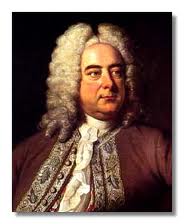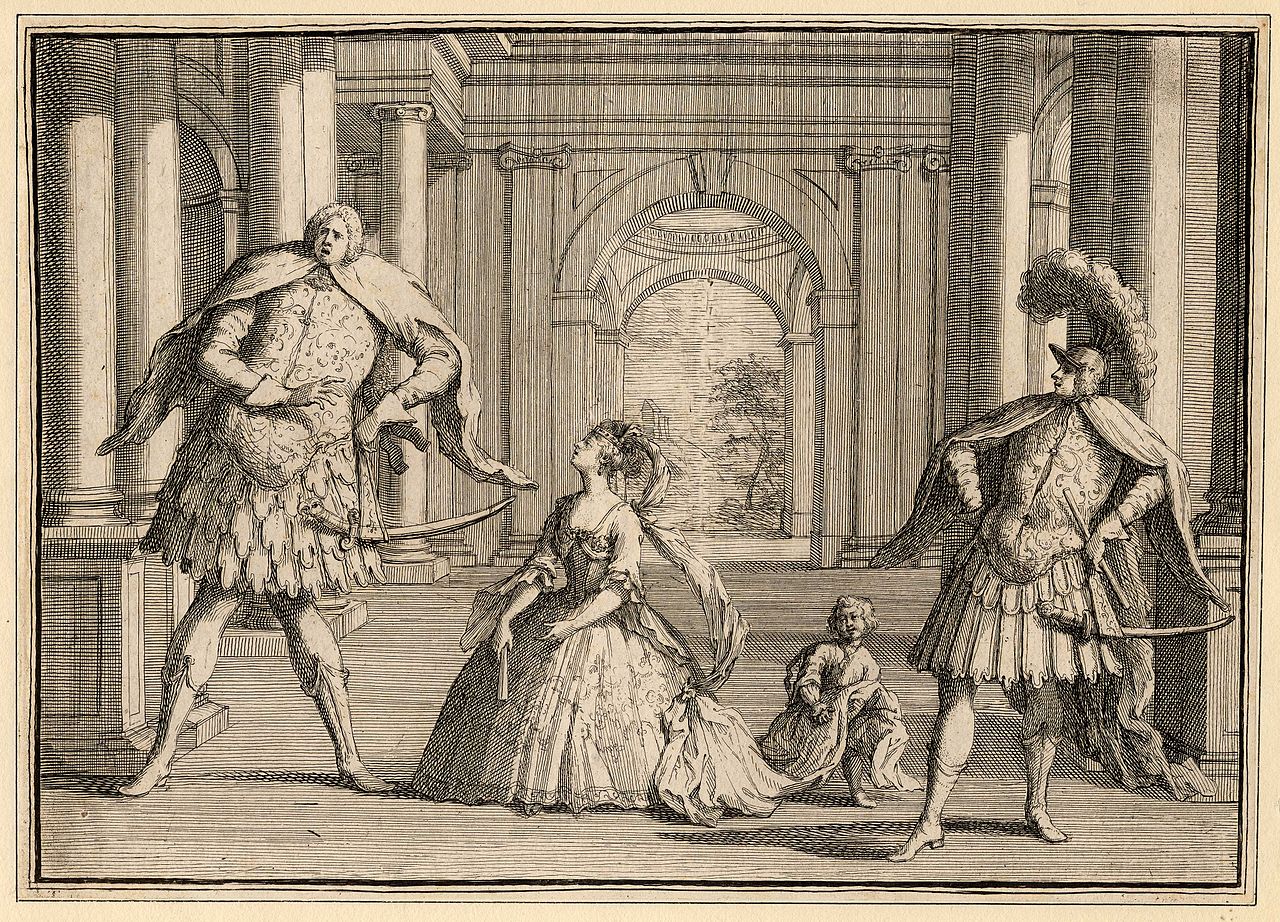This Week in Classical Music: February 17, 2020.Handel and Corelli.This week we celebrate the 335th birthday anniversary of George Frideric Handel, who was born in Halle on February 23rd of 1685.We’ve written about this great composer many times: here, for example is the entry from last year.In our library you can find samples from several of his operas (he composed almost 50 of them), such as Rinaldo, Xerxes, Ariodante, or Jiulio Cesare.Not all of them are equal, but Rodelinda is one of the most beautiful.It was written in 1725 and premiered at the King’s Theatre in Haymarket, London.The famous soprano Francesca Cuzzoni sung the role of Rodelinda, Queen of Lombardy.Senesino, Handel’s favorite castrato singer, was Bertarido, the defeated King of Lombardy.Another Handel’s favorite, the baritone Giuseppe Maria Boschi sung the role of the duke of Turin.According to Charles Burney, the 18th century musicologist and historian, during the premier of Rodelinda Cuzzoni “wore a brown silk dress trimmed with silver, with the vulgarity and indecorum of which all the old ladies were much scandalized, the young adopted it as a fashion, so universally, that it seemed a national uniform for youth and beauty."(The contemporary caricature features Cuzzoni at the center and Senesino at the left).Burney thought very highly of the opera and wrote that Rodelinda "contains such a number of capital and pleasing airs, as entitles it to one of the first places among Handel's dramatic productions." Here’s the aria Io t'abbraccio (I embrace you) from Act II of the opera.Rodelinda is sung by the mezzo-soprano Magdalena Kozena; Bertarido is David Daniels, a counter tenor.
When Handel was twenty, he moved to Italy and lived there for the next five years, mostly in Rome.There he met Arcangelo Corelli, thirty-two years older (Corelli was born on February 17th of 1653) and already famous.Still, a rivalry of sorts developed.Corelli was not just a composer, he was renowned as a violinist.As a matter of taste, Corelli played and composed for the violin mostly in the middle register of the instruments.Handel also played the violin (and the keyboard).His overture to the oratorio The Triumph of Time and Truth (with the aria Lascia la spina, which Handel later reworked into the famous Lascia ch’io pianga in Rinaldo), had a high note, which Corelli refused to play.Handel did, and thus offended Corelli terribly.But in reality, Handel liked Corelli’s music and fashioned his Concerti Grossi op. 6 after Corelli’s own op. 6 Concerti.Here’s Corelli’s Concerto grosso in G minor, Op. 6, No. 8 (Christmas Concerto).It’s performed by I Musici.
Two very interesting pianists were also born this week: Benno Moiseiwitsch on February 22nd of 1890 and Nikita Magaloff on February 21st of 1912.We’ll celebrate Moiseiwitsch’s birthday next week together with Chopin’s.
Handel and Corelli, 2020
This Week in Classical Music: February 17, 2020. Handel and Corelli. This week we celebrate the 335th birthday anniversary of George Frideric Handel, who was born in Halle on February 23rd of 1685. We’ve written about this great composer many times: here, for example is the entry from last year. In our library you can find samples from several of his operas (he composed almost 50 of them), such as Rinaldo, Xerxes, Ariodante, or Jiulio Cesare. Not all of them are equal, but Rodelinda is one of the most beautiful. It was written in 1725 and premiered at the King’s Theatre in Haymarket, London. The famous soprano Francesca Cuzzoni sung the role of Rodelinda, Queen of Lombardy. Senesino, Handel’s favorite castrato singer, was Bertarido, the defeated King of Lombardy. Another Handel’s favorite, the baritone Giuseppe Maria Boschi sung the role of the duke of Turin. According to Charles Burney, the 18th century musicologist and historian, during the premier of Rodelinda Cuzzoni “wore a brown silk dress trimmed with silver, with the vulgarity and indecorum of which all the old ladies were much scandalized, the young adopted it as a fashion, so universally, that it seemed a national uniform for youth and beauty." (The contemporary caricature features Cuzzoni at the center and Senesino at the left).
in Halle on February 23rd of 1685. We’ve written about this great composer many times: here, for example is the entry from last year. In our library you can find samples from several of his operas (he composed almost 50 of them), such as Rinaldo, Xerxes, Ariodante, or Jiulio Cesare. Not all of them are equal, but Rodelinda is one of the most beautiful. It was written in 1725 and premiered at the King’s Theatre in Haymarket, London. The famous soprano Francesca Cuzzoni sung the role of Rodelinda, Queen of Lombardy. Senesino, Handel’s favorite castrato singer, was Bertarido, the defeated King of Lombardy. Another Handel’s favorite, the baritone Giuseppe Maria Boschi sung the role of the duke of Turin. According to Charles Burney, the 18th century musicologist and historian, during the premier of Rodelinda Cuzzoni “wore a brown silk dress trimmed with silver, with the vulgarity and indecorum of which all the old ladies were much scandalized, the young adopted it as a fashion, so universally, that it seemed a national uniform for youth and beauty." (The contemporary caricature features Cuzzoni at the center and Senesino at the left).  Burney thought very highly of the opera and wrote that Rodelinda "contains such a number of capital and pleasing airs, as entitles it to one of the first places among Handel's dramatic productions." Here’s the aria Io t'abbraccio (I embrace you) from Act II of the opera. Rodelinda is sung by the mezzo-soprano Magdalena Kozena; Bertarido is David Daniels, a counter tenor.
Burney thought very highly of the opera and wrote that Rodelinda "contains such a number of capital and pleasing airs, as entitles it to one of the first places among Handel's dramatic productions." Here’s the aria Io t'abbraccio (I embrace you) from Act II of the opera. Rodelinda is sung by the mezzo-soprano Magdalena Kozena; Bertarido is David Daniels, a counter tenor.
When Handel was twenty, he moved to Italy and lived there for the next five years, mostly in Rome. There he met Arcangelo Corelli, thirty-two years older (Corelli was born on February 17th of 1653) and already famous. Still, a rivalry of sorts developed. Corelli was not just a composer, he was renowned as a violinist. As a matter of taste, Corelli played and composed for the violin mostly in the middle register of the instruments. Handel also played the violin (and the keyboard). His overture to the oratorio The Triumph of Time and Truth (with the aria Lascia la spina, which Handel later reworked into the famous Lascia ch’io pianga in Rinaldo), had a high note, which Corelli refused to play. Handel did, and thus offended Corelli terribly. But in reality, Handel liked Corelli’s music and fashioned his Concerti Grossi op. 6 after Corelli’s own op. 6 Concerti. Here’s Corelli’s Concerto grosso in G minor, Op. 6, No. 8 (Christmas Concerto). It’s performed by I Musici.
Two very interesting pianists were also born this week: Benno Moiseiwitsch on February 22nd of 1890 and Nikita Magaloff on February 21st of 1912. We’ll celebrate Moiseiwitsch’s birthday next week together with Chopin’s.